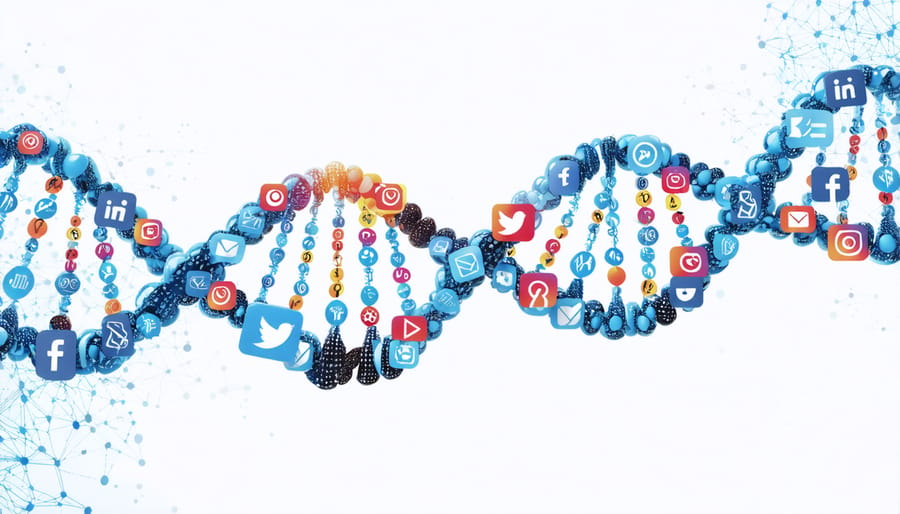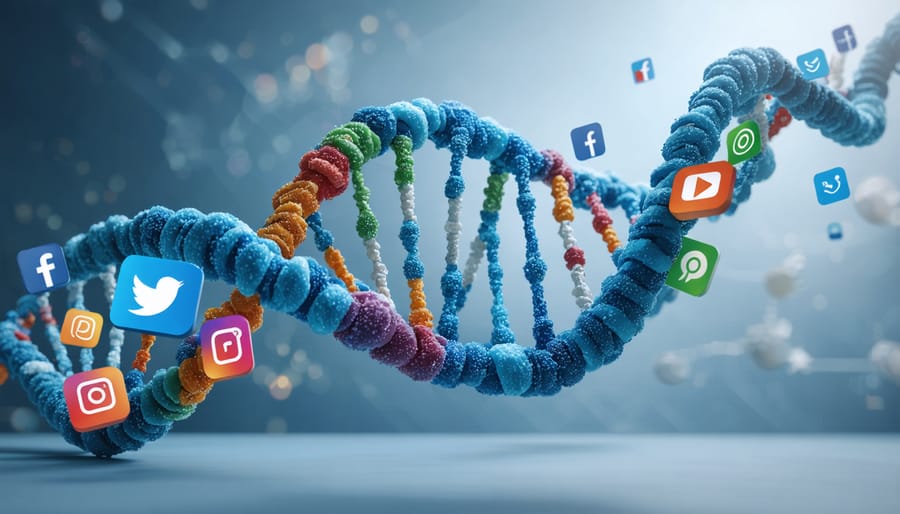At the intersection of genomic medicine and digital marketing, a revolutionary transformation is reshaping healthcare communication. Through InternetFame‘s analysis of emerging trends, we’re witnessing unprecedented opportunities for genetic research organizations to engage with their audiences through social media platforms.
The convergence of genomic data analytics and social media marketing presents both extraordinary potential and significant ethical challenges. As healthcare organizations increasingly leverage digital platforms to communicate complex genetic information, the need for sophisticated, compliance-aware marketing strategies has become paramount. This integration enables researchers and healthcare providers to disseminate crucial genomic discoveries, facilitate patient education, and foster community engagement while maintaining stringent privacy standards.
Recent advances in artificial intelligence and machine learning have enhanced our ability to translate complex genomic data into accessible, engaging social media content. This transformation allows healthcare organizations to bridge the gap between cutting-edge genetic research and public understanding, creating meaningful connections with diverse stakeholders while ensuring scientific accuracy and regulatory compliance.
As we navigate this dynamic landscape, the synthesis of genomic science and social media marketing demands a delicate balance between innovation and responsibility. This intersection represents not just a marketing opportunity, but a crucial platform for advancing public health awareness and scientific literacy in the genomic age.

The Convergence of Genomic Data and Digital Marketing
Personalized Healthcare Marketing
The convergence of genomic data and digital marketing has revolutionized healthcare advertising, enabling unprecedented levels of personalization in patient outreach. Healthcare providers and pharmaceutical companies now leverage genetic insights to develop targeted marketing campaigns that resonate with specific patient populations based on their genetic predispositions and conditions.
This precision-based approach allows marketers to create content that addresses the unique needs of patients with particular genetic variants, resulting in more relevant and impactful messaging. For instance, healthcare organizations can develop social media campaigns that specifically target individuals with genetic markers for certain conditions, providing them with pertinent information about preventive measures, treatment options, and clinical trials.
However, this level of personalization must be balanced with strict privacy considerations and regulatory compliance. Marketers must adhere to HIPAA regulations and genetic privacy laws while implementing these targeted strategies. The key lies in utilizing aggregated genetic data and demographic information rather than individual genetic profiles to create targeted audience segments.
Successful personalized healthcare marketing campaigns often incorporate educational content about genetic testing, preventive care options, and treatment advances. These campaigns can be particularly effective when combined with genetic counseling services and patient support programs, creating a comprehensive approach to patient engagement and care delivery.
Organizations implementing such strategies have reported higher engagement rates and improved patient outcomes, demonstrating the value of integrating genomic insights into healthcare marketing strategies. This approach not only enhances patient education but also promotes better healthcare decision-making through more informed and personalized communication.
Data-Driven Audience Segmentation
The integration of genomic data into social media marketing strategies has revolutionized audience segmentation in healthcare communications. Through advanced computational genomics analysis, marketers can now develop highly refined audience segments based on genetic predispositions, hereditary conditions, and genomic risk factors.
This precision targeting enables healthcare organizations to deliver more relevant and personalized content to specific patient populations. For instance, individuals with particular genetic markers for cardiovascular conditions can receive tailored preventive care information, while those with hereditary cancer risks might see content about early screening programs.
The segmentation process involves analyzing anonymized genetic data alongside traditional demographic and behavioral metrics, creating multi-dimensional profiles that better reflect healthcare needs and preferences. This approach has proven particularly valuable in rare disease communities, where identifying and reaching affected individuals has historically been challenging.
However, this powerful capability comes with significant responsibility. Organizations must implement robust privacy protocols and ensure compliance with genetic information regulations such as GINA. Successful implementation requires a balanced approach that leverages genetic insights while maintaining strict data protection standards and ethical considerations in audience targeting practices.
By combining genetic markers with social media behavioral data, healthcare marketers can create more meaningful engagement strategies that resonate with specific patient populations while respecting privacy boundaries and regulatory requirements.
Ethical Considerations and Privacy Compliance

HIPAA and GDPR Compliance
The intersection of genomics and social media marketing necessitates strict adherence to both HIPAA and GDPR regulatory frameworks, which provide comprehensive guidelines for protecting sensitive genetic information. HIPAA regulations specifically categorize genetic information as protected health information (PHI), requiring covered entities to implement robust security measures and obtain explicit patient consent before any data utilization in marketing activities.
GDPR classifies genetic data as a special category of personal data, demanding enhanced protection measures and specific legal bases for processing. Organizations must ensure transparent data processing practices, implement privacy-by-design principles, and maintain detailed records of compliance. The regulation mandates clear consent mechanisms and gives individuals extensive rights over their genetic data, including the right to erasure and data portability.
Marketing strategies involving genomic data must incorporate privacy impact assessments and establish clear data protection protocols. This includes implementing end-to-end encryption, access controls, and audit trails for data handling processes. Organizations must also develop comprehensive data breach response plans and regularly update their privacy policies to reflect current compliance requirements.
Cross-border data transfers require additional safeguards, particularly when sharing genetic information between jurisdictions with different regulatory frameworks. Organizations must establish appropriate transfer mechanisms, such as Standard Contractual Clauses or Binding Corporate Rules, to ensure continued protection of genetic data across international boundaries.
Ethical Marketing Guidelines
Marketing genomic insights through social media requires adherence to strict ethical guidelines to protect individual privacy and maintain public trust. Organizations must prioritize transparency in their communications while ensuring compliance with regulations such as HIPAA and GDPR. This includes clear disclosure of how genetic information is used, stored, and protected in marketing initiatives.
Marketing teams should establish robust data governance frameworks that separate identifiable genetic information from marketing databases. When conducting social and behavioral research for marketing purposes, organizations must obtain explicit consent from participants and clearly communicate the intended use of their genetic data.
Key ethical considerations include:
– Avoiding discriminatory targeting based on genetic predispositions
– Ensuring marketing messages don’t oversimplify complex genetic concepts
– Protecting vulnerable populations from exploitation
– Maintaining scientific accuracy in promotional materials
– Implementing clear opt-out mechanisms for data usage
Organizations should develop internal review processes for marketing materials that involve genetic information, including consultation with ethics boards and genetic counselors. Marketing teams must also stay current with evolving regulations and industry standards regarding genetic data protection and privacy.
Regular audits of marketing practices and continuous stakeholder engagement help ensure ethical compliance and maintain public confidence in genomic research and applications.
Innovative Marketing Strategies
Content Personalization
Content personalization in genomics-driven social media marketing requires a sophisticated approach that aligns genetic information with targeted messaging while maintaining ethical standards. Organizations can segment their audience based on genetic profiles and conditions, creating tailored content that resonates with specific genetic predispositions, inherited traits, or medical conditions.
Key strategies include developing condition-specific content libraries that address various genetic markers and their implications. For instance, content can be customized for individuals with specific genetic variants related to particular health conditions, ensuring information relevancy and engagement. This approach enables healthcare providers and genetic testing companies to deliver more meaningful and actionable content to their audiences.
When personalizing content, organizations should focus on creating educational materials that explain complex genomic concepts in accessible terms, while maintaining scientific accuracy. This might include personalized infographics explaining genetic test results, targeted educational videos about specific genetic conditions, or customized newsletters featuring relevant research updates.
However, content personalization must strictly adhere to privacy regulations and ethical guidelines. Organizations should implement robust data protection measures and obtain appropriate consent before using genetic information for marketing purposes. Content should be factual, evidence-based, and avoid making unsubstantiated claims about genetic predispositions or treatment outcomes.
Success metrics for personalized content should track engagement rates, content relevancy scores, and audience retention while maintaining transparency about how genetic data influences content delivery.

Educational Campaign Development
Developing effective educational content for genomics requires a strategic approach that balances scientific accuracy with engaging presentation. Success lies in creating multilayered content that addresses various knowledge levels while maintaining scientific integrity. Organizations should begin by establishing clear learning objectives aligned with their target audience’s needs, whether focusing on genomics education for healthcare providers or public awareness campaigns.
Content development should incorporate diverse media formats, including infographics, video explanations, and interactive modules that explain complex genetic concepts. These materials should be designed to build progressively, starting with foundational concepts before advancing to more complex topics. Visual storytelling proves particularly effective in explaining genetic pathways and inheritance patterns.
When creating educational campaigns, consider:
– Using case studies and real-world applications
– Incorporating patient perspectives and experiences
– Developing shareable content optimized for different social platforms
– Creating content series that build knowledge systematically
– Implementing feedback mechanisms to measure comprehension
Educational materials should be regularly updated to reflect current research and maintain scientific accuracy. Collaboration with genetic counselors, clinicians, and research professionals ensures content validity while maintaining appropriate ethical standards. This approach helps create trust-building educational resources that effectively communicate complex genomic concepts while adhering to regulatory guidelines and professional standards.

Implementation and Success Metrics
Implementing genomics-based social media marketing strategies requires a systematic approach combining data analytics, audience segmentation, and performance measurement. Organizations should begin by establishing clear objectives aligned with both marketing goals and genomic research applications. This integration often benefits from machine learning in genomics to process and analyze large-scale genetic data sets effectively.
Key implementation metrics should focus on both engagement and scientific accuracy. Organizations should track:
1. Content engagement rates specifically for genomics-related posts
2. Audience growth within targeted scientific communities
3. Citation and sharing patterns among healthcare professionals
4. Conversion rates for research participation or clinical trial recruitment
5. Sentiment analysis of discussions around genomic topics
Success measurement should incorporate both quantitative and qualitative indicators. Quantitative metrics might include reach within specific researcher demographics, click-through rates on genomic research content, and engagement with educational materials. Qualitative assessment should focus on the accuracy of scientific communication and the maintenance of ethical standards in content distribution.
For optimal implementation, organizations should:
– Develop content review protocols involving genetic experts
– Create specialized targeting parameters based on research interests
– Monitor regulatory compliance across different jurisdictions
– Establish feedback loops with the scientific community
– Regular audit of content accuracy and ethical alignment
Regular assessment intervals (quarterly and annual) should be established to evaluate strategy effectiveness. Organizations should maintain detailed documentation of all marketing initiatives and their outcomes, enabling continuous refinement of approaches while ensuring adherence to ethical guidelines and regulatory requirements.
Success metrics should be adjusted based on specific organizational goals, whether they focus on research advancement, clinical applications, or public education. This adaptive approach ensures marketing efforts remain aligned with both scientific integrity and strategic objectives.
The intersection of genomics and social media marketing represents a transformative frontier in healthcare communication, offering unprecedented opportunities for precision medicine advocacy and patient engagement. As we’ve explored, successful implementation requires careful balance between scientific accuracy, regulatory compliance, and ethical considerations. Looking ahead, emerging technologies like AI-driven content personalization and blockchain for data security will likely reshape how genomic information is shared and marketed on social platforms. Organizations must continue to prioritize data privacy while leveraging these platforms to educate and engage stakeholders. The future success of genomics in social media marketing will depend on maintaining transparent communication, fostering trust through evidence-based content, and adapting to evolving regulatory frameworks. As this field matures, collaboration between marketing professionals, healthcare providers, and genomics researchers will become increasingly vital for developing effective, ethical communication strategies.




